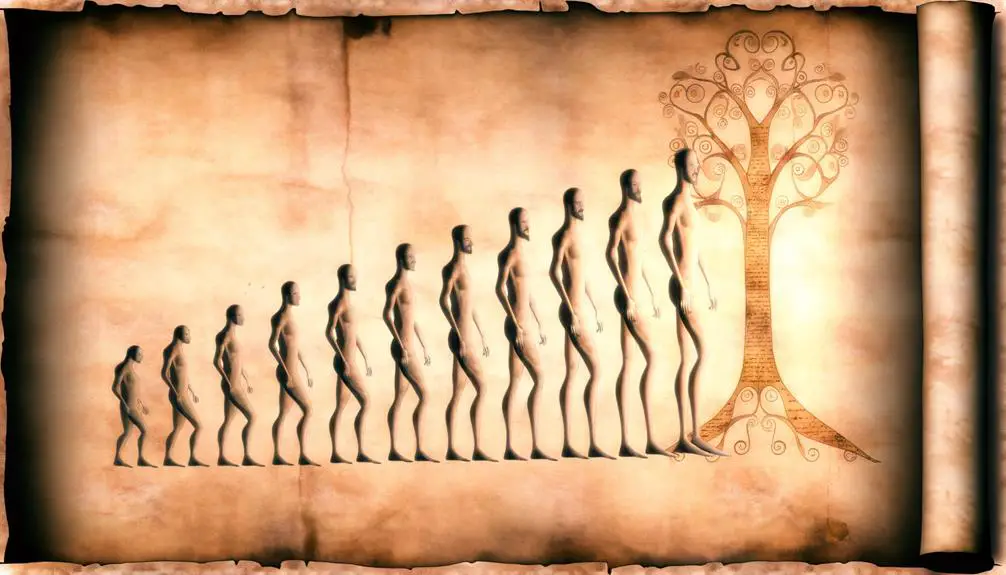Peek into the profound symbolism of the number 10 in biblical lore, uncovering layers of divine messages and historical significance.

What Does the Number 10 Signify in the Bible
Throughout the textured tapestry of biblical texts, the number 10 frequently finds itself at the forefront of foundational faith moments. You'll notice it's not just a number; it's a symbol steeped in significance, from the Ten Commandments that Moses received to the ten plagues that besieged Egypt.
This numeral nudges us to consider its deeper meaning and the divine messages it may convey. As you explore the instances of ten in the Bible, such as the tithe, the ten generations from Adam, or the parable of the ten virgins, you'll uncover layers of spiritual significance that might just reshape your understanding of biblical numerology.
Why does the number 10 hold such powerful resonance across various contexts? The answer might surprise you.
Key Takeaways
- The number 10 symbolizes divine order and completeness, as seen in the Ten Commandments.
- It represents God's power and judgment through events like the Ten Plagues of Egypt.
- Ten is linked to spiritual practices, such as tithing and the Ten Days of Repentance.
- Biblical narratives use the number 10 to teach lessons on faith, preparedness, and moral integrity.
The Ten Commandments

Among the most foundational elements within biblical scripture, the Ten Commandments serve as a critical moral compass, guiding both individual behavior and societal norms. These tenets, delivered to Moses on Mount Sinai, encapsulate the core of ethical conduct and the relationship between humanity and the divine. What you'll find fascinating is how these commandments transcend their immediate religious context to have profound moral implications and societal impact.
The first four commandments focus on one's relationship with God, emphasizing the importance of faith, reverence, and worship. This not only shapes personal spirituality but also molds the moral framework within which societies operate. The remaining six commandments delve into interpersonal relations, advocating for respect, honesty, and integrity. These guidelines don't just dictate personal conduct; they lay the foundation for societal laws and norms, influencing legal systems and community values across civilizations.
The societal impact of the Ten Commandments is immense, fostering a sense of justice, morality, and communal harmony. By setting clear boundaries for behavior, they facilitate social cohesion and order. Moreover, the moral implications of these commandments are significant. They challenge individuals to self-reflect, hold ethical considerations in high regard, and strive for a higher moral standard in both personal dealings and community engagement.
In essence, the Ten Commandments aren't just a list of do's and don'ts; they're a blueprint for a morally upright and socially cohesive existence. Their enduring relevance underscores their power to shape both individual character and collective societal ethos, making them a cornerstone of ethical and moral guidance throughout history.
Ten Plagues of Egypt

Reflecting on the moral and societal frameworks established by the Ten Commandments, it's imperative to explore another significant biblical event marked by the number 10: the Ten Plagues of Egypt. This sequence not only showcases divine intervention but also highlights Moses' leadership in the face of Pharaoh's defiance.
The plagues were a direct response to Pharaoh's refusal to release the Israelites from bondage, showcasing a battle of wills between divine authority and human arrogance. Moses, under God's command, presented himself as a mediator, a role that demanded unwavering faith and resilience. Each plague escalated in intensity, underscoring the seriousness of Pharaoh's obstinacy and the suffering it brought upon his people.
The plagues included:
- Water turning to blood
- Frogs
- Gnats
- Flies
- Livestock disease
These events weren't random calamities but carefully chosen signs, each with a specific message aimed at undermining the Egyptian gods and demonstrating the one true God's power. The plagues challenged the Egyptians' theological and societal structures, pushing them to recognize a power beyond their comprehension.
Analyzing these plagues underlines the themes of liberation and justice that are recurrent throughout the Bible. Moses' leadership, characterized by patience and determination, becomes a pivotal element in the narrative, showcasing the virtues of faith and obedience against the backdrop of Pharaoh's defiance and the resulting chaos.
The Ten Plagues of Egypt, therefore, aren't merely historical or theological curiosities but profound lessons in leadership, faith, and the consequences of defiance against divine will.
Tithe: The Tenth Share

Delving into the concept of tithe reveals its foundational role in establishing a system of communal support and religious dedication by mandating the contribution of a tenth share of one's earnings or produce. This practice, deeply embedded in biblical traditions, not only serves as a form of charitable obligation but also nurtures a profound spiritual discipline among believers. By setting aside a tenth, you're constantly reminded of the broader community's needs and the importance of supporting the religious institution that fosters spiritual growth and guidance.
The tithe isn't merely a charitable act; it's a covenant with the divine, a testament to one's faith and commitment to God's work on Earth. It's a discipline that teaches you the value of generosity, not as an occasional gesture but as a regular, ingrained practice. This system ensures that the religious community can sustain itself and support those in need, reinforcing the bonds between its members and promoting a spirit of communal welfare.
Moreover, the tithe acts as a spiritual barometer, a way to gauge your trust in God's provision. It challenges you to relinquish a portion of your material success, trusting that this act of faith won't lead to want but will be rewarded with abundance, both materially and spiritually. Through this practice, you learn the balance between personal sustenance and the obligation to contribute to the collective well-being, making the tithe a cornerstone in the development of a resilient, supportive, and spiritually vibrant community.
Ten Generations From Adam

You'll find that the ten generations from Adam encapsulate not only a genealogical significance but also mark historical milestones within the biblical narrative. Each generation serves as a testament to the unfolding of God's plan, exhibiting a structured timeline that intertwines with the broader themes of creation, fall, and redemption.
This enumeration asserts a pattern that scholars argue reflects divine order and intentionality, offering a lens through which to interpret the progression of biblical history.
Genealogical Significance
In examining the genealogical records of the Bible, it's evident that the number ten holds significant importance, notably in the ten generations from Adam to Noah. This sequence isn't just a chronological listing; it's steeped in numerical symbolism and represents a foundational structure for understanding family lineages within the biblical narrative.
- Numerical symbolism: Ten symbolizes completeness and God's law.
- Family lineages: Demonstrates the continuity of God's plan through generations.
- Adam to Noah: Marks a significant epoch in humanity's early spiritual journey.
- Genealogical importance: Highlights the interconnectivity of biblical figures.
- Biblical narrative structure: Serves as a framework for the unfolding of divine action through human history.
This analysis underscores the depth and complexity inherent in biblical genealogies, revealing layers of meaning beyond mere names and dates.
Historical Milestones
Adam's lineage, spanning ten generations to Noah, marks pivotal historical milestones that deeply influence our understanding of biblical events and divine orchestration. This sequence isn't arbitrary; it's a deliberate design, showcasing a pattern that transcends mere genealogy.
The number 10, represented in Roman numerals as X, holds a place of significance not only in biblical contexts but also in the foundational structures of mathematics and language, such as the Decimal system. This system, pivotal to understanding quantities and their relationships, mirrors the organized, purposeful nature of these generational milestones.
Each generation, from Adam to Noah, serves as a testament to the deliberate progression and cyclical patterns that define human history and divine intervention, illustrating a complex interplay between numerology, theology, and the unfolding of human events.
The Ten Days of Repentance

You'll find the Ten Days of Repentance, spanning from Rosh Hashanah to Yom Kippur, intricately linked with themes of introspection and renewal in the biblical narrative.
These days aren't merely chronological markers; they embody a profound period for spiritual reflection and atonement within the Jewish faith.
Understanding the rituals and the underlying significance of these ten days offers insight into their role in fostering individual and communal transformation.
Significance of Ten Days
The Ten Days of Repentance, a pivotal period within the Jewish High Holy Days, serve as a profound opportunity for self-examination and spiritual renewal, drawing from the rich tapestry of biblical tradition and practice. This period embodies a deeper layer of spiritual significance, as reflected in various biblical narratives and prophecies.
- Daniel's prophecy: Emphasizes the importance of introspection and divine judgment, aligning with the essence of these ten days.
- Revelation symbolism: Offers a complex understanding of repentance and redemption.
- Spiritual renewal: Encourages a personal and communal return to faith.
- Self-examination: Calls for a critical review of one's actions and intentions.
- Divine judgment: Reflects on the notion that this period is a time to seek forgiveness and make amends.
This analytical exploration underscores the multifaceted significance of the Ten Days of Repentance within a biblical and theological context.
Repentance Rituals Explained
Why do the Ten Days of Repentance hold such profound significance in biblical tradition, and how are the associated rituals meticulously designed to guide believers through a process of spiritual cleansing and renewal? These days are framed within a period that emphasizes forgiveness practices and moral transformation, serving as a cornerstone for one's spiritual journey.
Aspect |
Detail |
|---|---|
Purpose |
Facilitating a deep introspection and moral inventory. |
Process |
Engaging in forgiveness practices, seeking and granting pardon. |
Outcome |
Achieving moral transformation and spiritual renewal. |
This structured approach ensures that you're not just going through the motions but are genuinely engaged in a transformative experience. Through these rituals, you're invited to reflect, repent, and ultimately, renew your commitment to a life aligned with divine principles.
The Parable of the Ten Virgins

In examining the Parable of the Ten Virgins, one finds a profound demonstration of preparedness and vigilance within a spiritual context. This narrative, deeply entrenched in Christian theology, utilizes the number ten to underscore the universal applicability of its message. It's not merely a tale of ten virgins awaiting a bridegroom, but a layered allegory emphasizing the significance of being spiritually ready at all times.
The core elements of this parable include:
- Oil symbolism: Representing spiritual preparedness and the Holy Spirit, the oil is a crucial element that differentiates the wise virgins from the foolish ones.
- Preparedness importance: The prepared virgins had brought extra oil, symbolizing their readiness for the bridegroom's arrival, regardless of the time.
- Unexpectedness of the bridegroom's arrival: This element underlines the theme of vigilance, as the exact time of the bridegroom's coming is unknown.
- The division of the virgins into wise and foolish: This dichotomy serves as a stark reminder of the outcomes based on one's spiritual state.
- The closed door: Symbolizing the finality of the bridegroom's arrival, it underscores the consequence of being unprepared.
This parable serves as a poignant reminder of the importance of spiritual vigilance and preparedness. The use of oil as a symbol highlights the necessity of maintaining one's spiritual life with diligence, as the moment of ultimate accountability may arrive unexpectedly. Through this narrative, the message is clear: readiness for the spiritual calls of life isn't optional but essential for all.
The Ten Lost Tribes

Exploring the narrative of the Ten Lost Tribes reveals a complex tapestry of history, prophecy, and enduring mystery within biblical scholarship. These tribes, constituting the majority of the ancient kingdom of Israel, lost their tribal identity following the Assyrian conquest in 722 BCE. This event dispersed them, leading to centuries of speculation, research, and various modern theories about their fate and whereabouts.
The term "Lost Tribes" not only signifies the physical dispersal of these groups but also symbolizes the loss of their collective cultural and religious identity. The quest to uncover their stories intertwines archaeological findings, historical records, and scriptural interpretations, each adding layers to our understanding but also deepening the enigma.
Modern theories about the Lost Tribes range from their assimilation into other societies to remarkable claims of their survival in isolated communities across the globe. These hypotheses often reflect a blend of historical facts, speculative connections, and, at times, a longing for continuity in tribal identity that transcends millennia.
Aspect |
Impact on Research |
Current Views |
|---|---|---|
Archaeological |
Provides tangible clues |
Often raises more questions |
Historical Records |
Traces movements |
Limited by gaps in documentation |
Scriptural Interpretations |
Guides spiritual understanding |
Diverse and often conflicting |
This multifaceted approach underscores the complexity of pinpointing the fate of the Ten Lost Tribes. As scholars delve into this mystery, they navigate a delicate balance between historical data, scriptural insights, and the nuances of tribal identity, each aspect offering a unique lens through which to view this enduring puzzle.
Frequently Asked Questions
How Does the Number 10 Relate to the Creation Story Outside of the Genealogies?
In exploring how the number 10 connects to the creation story beyond genealogies, it's crucial to recognize its symbolic significance.
While not directly tied to creation, the Decalogue commands and the Ten Plagues indirectly reflect order and judgment themes present in the creation narrative.
These instances underscore the number's role in emphasizing completeness and divine authority, illustrating how foundational concepts of order and morality are woven throughout the biblical text.
Is the Number 10 Used Symbolically in Any of the Prophetic Books of the Bible, and if So, How?
In the prophetic books, you won't find the number 10 lounging around; it's hard at work, symbolizing divine order and completeness.
For instance, the Ten Commandments are a cornerstone, embodying law and ethics.
In Daniel's visions, the number 10 doesn't make a flashy appearance, but its essence of completeness and God's sovereign control echoes through the symbolic narratives.
It's a subtle nod to continuity and divine perfection in a chaotic world.
Are There Any Significant Events in the New Testament That Involve the Number 10 Aside From the Parable of the Ten Virgins?
You're exploring significant New Testament events involving the number 10, beyond the parable of the ten virgins. Consider the healing of the ten lepers, an event showcasing Jesus' power and mercy.
This narrative emphasizes not just the miraculous healing, but also the importance of gratitude, as only one leper returns to thank Jesus.
While the Ten Commandments are Old Testament, their moral principles echo throughout the New Testament, influencing Jesus' teachings and parables.
How Has the Symbolism of the Number 10 Been Interpreted or Used in Christian Liturgical Practices Outside of the Ten Days of Repentance?
In Christian liturgical practices, the symbolism of the number 10 extends beyond repentance. Tithing practices, where you're encouraged to give a tenth of your earnings, reflect this significance.
Similarly, Decalogue observance, which involves adhering to the Ten Commandments, is another key example. These practices not only uphold the number's symbolic weight but also embed it deeply into daily spiritual life, demonstrating its enduring importance in shaping ethical and communal norms.
In What Ways Have Theologians Connected the Concept of the Number 10 to Principles of Divine Order or Perfection Throughout Biblical Narratives?
You've noticed theologians often link the number 10 to divine order and perfection in biblical stories. Through their analysis, the Ten Commandments emerge as a cornerstone, symbolizing moral perfection and God's governance.
Similarly, the Ten Plagues illustrate a divine order, enforcing justice and demonstrating God's power. This connection underscores a belief in a meticulously ordered universe, guided by divine principles, where the number 10 serves as a marker of completeness and divine authority.
Conclusion
In your spiritual journey through the Bible, you've witnessed the number 10 transcend mere digits, morphing into a beacon of divine order and completeness. From the Ten Commandments that shape moral foundations to the Ten Plagues showcasing divine justice, and the mystical Ten Lost Tribes, each instance is a thread in the tapestry of faith.
This isn't just numerology; it's a celestial GPS guiding humanity. Embrace the number 10, for in its essence lies the heartbeat of divine wisdom and the blueprint of spiritual evolution.



Sign up